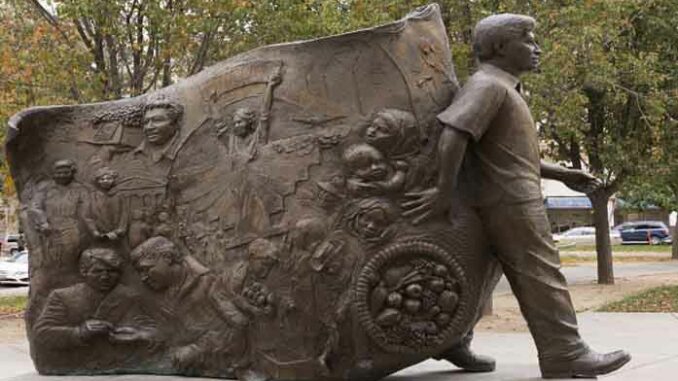
WASHINGTON – Rep. Paul Gosar has found an unusual way to honor the late Cesar Chavez, a union labor leader and Latino civil rights activist, who was a critic of illegal immigration. This week, Gosar introduced H.Res. 268, a resolution supporting the designation of Cesar Chavez’s birthday, March 31st, as National Border Control Day.
President Obama proclaimed “March 31, 2014, as Cesar Chavez Day.
Chavez had testified in Congress against allowing companies to use illegal immigrants as cheap labor when his workers went on strike for better wages and conditions. “It is apparent that when the farmworkers strike and their strike is successful, the employers go to Mexico and have unlimited, unrestricted use of illegal alien strikebreakers to break the strike. And, for over 30 years, the Immigration and Naturalization Service has looked the other way and assisted in the strikebreaking,” he said.
According to a statement released by Gosar, his resolution “expresses strong support for Cesar Chavez’s fight to defend the interests of the American farmworkers, and for his recognition that non-violent action could protect these workers against the business interests which would replace them with illegal foreign labor; and encourages recognition and celebration of National Border Control Day.”
“Cesar Chavez’s lifelong work to protect American workers should be echoed and celebrated throughout America,” said Gosar in his announcement. “As open border Democrats continue to advocate against securing our southern border, it is critical to remember the damage illegal immigration does to legal American workers.”
Similar legislation was proposed by Rep. Louie Gohmert, in 2018. Gohmert said Chavez as the head of the United Farm Workers “believed that preventing illegal immigration was an essential prerequisite to improving the circumstances of American farmworkers.”
Following his death at the age of sixty-six in 1993, twenty-five thousand people marched for more than two-and-a-half hours to the spot where Chavez founded the United Farm Workers Union. There, the mourners recalled his extraordinary legacy. As a result of his efforts, the most backbreaking tool used by farm workers, the short hoe, was eliminated, and the use of many dangerous pesticides in the grape fields was prohibited. His labors also brought about a seventy percent increase in real wages from 1964 to 1980, and establishment of health care benefits, disability insurance, pension plans, and standardized grievance procedures for farm workers. He helped secure passage in California in 1975 of the nation’s first agricultural labor relations act, which prohibited growers from firing striking workers or engaging in bad-faith bargaining. Thanks to his efforts, migrant farm laborers won a right held by all other American workers: the right to bargain collectively.
